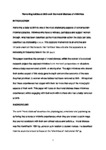Removal of babies at birth and the moral distress of midwives
| dc.contributor.author | Marsh, W | |
| dc.contributor.author | Robinson, A | |
| dc.contributor.author | SHAWE, JILL | |
| dc.contributor.author | Gallagher, A | |
| dc.date.accessioned | 2020-07-15T13:59:46Z | |
| dc.date.available | 2020-07-15T13:59:46Z | |
| dc.date.issued | 2020-06 | |
| dc.identifier.issn | 0969-7330 | |
| dc.identifier.issn | 1477-0989 | |
| dc.identifier.other | ARTN 0969733019874503 | |
| dc.identifier.uri | http://hdl.handle.net/10026.1/16037 | |
| dc.description.abstract |
<jats:sec><jats:title>Background</jats:title><jats:p> Midwives and nurses appear vulnerable to moral distress when caring for women whose babies are removed at birth. They may experience professional dissatisfaction and their relationships with women, families and colleagues may be compromised. The impact of moral distress may manifest as anger, guilt, frustration, anxiety and a desire to give up their profession. While there has been much attention exploring the concept of moral distress in midwifery, this is the first study to explore its association in this context. </jats:p></jats:sec><jats:sec><jats:title>Aim</jats:title><jats:p> This article explores midwives’ experiences of moral distress when providing care to women whose babies were removed at birth and gives valuable insight into an issue nurses and midwives encounter in their profession. </jats:p></jats:sec><jats:sec><jats:title>Methods</jats:title><jats:p> Four mothers and eight midwives took part in this research. Narrative inquiry incorporating photo-elicitation techniques was used to generate data; mothers were interviewed face to face and midwives through focus groups. The images and audio data were collected, transcribed and analysed for emerging themes. For the purpose of this article, only the midwives’ stories are reported. This research received a favourable ethical opinion from the University of Surrey Ethics committee. </jats:p></jats:sec><jats:sec><jats:title>Ethical considerations</jats:title><jats:p> This study received a favourable ethical approval from a higher education institutes ethics committee. </jats:p></jats:sec><jats:sec><jats:title>Results</jats:title><jats:p> Midwives who care for women whose babies are removed at birth report it as one of the most distressing areas of contemporary clinical practice. Furthermore, they report feelings of guilt, helplessness and betrayal of the midwife–mother relationship. Many of the midwives in this study state that these experiences stay with them for a long time, far more than more joyful aspects of their role. </jats:p></jats:sec><jats:sec><jats:title>Conclusion</jats:title><jats:p> Midwives experience moral distress. Support systems, education and training must be available to them if we are to reduce the long-term impact upon them, alleviate their distress and prevent them from leaving the profession. </jats:p></jats:sec> | |
| dc.format.extent | 1103-1114 | |
| dc.format.medium | Print-Electronic | |
| dc.language | en | |
| dc.language.iso | en | |
| dc.publisher | SAGE Publications | |
| dc.subject | Babies | |
| dc.subject | distress | |
| dc.subject | ethical | |
| dc.subject | midwives | |
| dc.subject | moral | |
| dc.subject | removed | |
| dc.title | Removal of babies at birth and the moral distress of midwives | |
| dc.type | journal-article | |
| dc.type | Journal Article | |
| plymouth.author-url | https://www.webofscience.com/api/gateway?GWVersion=2&SrcApp=PARTNER_APP&SrcAuth=LinksAMR&KeyUT=WOS:000488433600001&DestLinkType=FullRecord&DestApp=ALL_WOS&UsrCustomerID=11bb513d99f797142bcfeffcc58ea008 | |
| plymouth.issue | 4 | |
| plymouth.volume | 27 | |
| plymouth.publication-status | Published | |
| plymouth.journal | Nursing Ethics | |
| dc.identifier.doi | 10.1177/0969733019874503 | |
| plymouth.organisational-group | /Plymouth | |
| plymouth.organisational-group | /Plymouth/Faculty of Health | |
| plymouth.organisational-group | /Plymouth/Faculty of Health/School of Nursing and Midwifery | |
| plymouth.organisational-group | /Plymouth/REF 2021 Researchers by UoA | |
| plymouth.organisational-group | /Plymouth/REF 2021 Researchers by UoA/UoA03 Allied Health Professions, Dentistry, Nursing and Pharmacy | |
| plymouth.organisational-group | /Plymouth/Research Groups | |
| plymouth.organisational-group | /Plymouth/Research Groups/Institute of Health and Community | |
| plymouth.organisational-group | /Plymouth/Research Groups/Plymouth Institute of Health and Care Research (PIHR) | |
| plymouth.organisational-group | /Plymouth/Users by role | |
| plymouth.organisational-group | /Plymouth/Users by role/Academics | |
| dc.publisher.place | England | |
| dcterms.dateAccepted | 2019-01-01 | |
| dc.rights.embargodate | 2022-1-25 | |
| dc.identifier.eissn | 1477-0989 | |
| dc.rights.embargoperiod | Not known | |
| rioxxterms.versionofrecord | 10.1177/0969733019874503 | |
| rioxxterms.licenseref.uri | http://www.rioxx.net/licenses/all-rights-reserved | |
| rioxxterms.licenseref.startdate | 2020-06 | |
| rioxxterms.type | Journal Article/Review |


